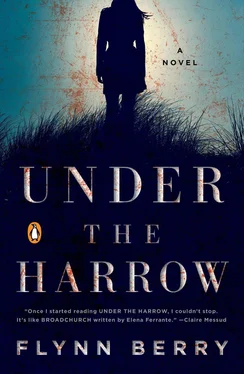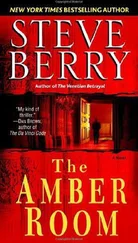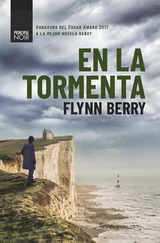IN POLPERRO, birds wheel over the masts of boats in the inner harbor. On the decks, a few men smoke as they ready their boats for the day, and I listen to their voices and the rigging clinking. I decide to stay in Cornwall for the next four days. There is no reason to return to Oxford until the prosecutor’s decision, and their deadline is five days from now.
• • •
For the next four days, I acted as though I were still scattering her ashes, and should visit only the places here she loved best. This meant a lot of driving.
I visited the rivers Fowey, Fal, and Helford. I ate at St. John’s in Fowey at sunset, as the windows across the estuary in Polruan became shimmering brass squares. I ordered what she would have ordered, which was rainbow trout. The drink was more difficult, and from her three favorites I chose a white Bordeaux.
I visited Frenchman’s Creek. I visited the fishing town of Cadgwith. I tried to find the falls she had talked about on the Lizard Peninsula, but couldn’t. It may have dried up. No one I asked had heard of a dark pink lighthouse either. She may have told me the wrong color, or I remembered it wrong. I visited Porthgwidden and found the stall where she bought buttered crumpets.
I visited Redruth. I visited Lostwithiel and Padstow. I rode the ferry across the bay. This was a pattern I could follow for the rest of my life. I could retrace her steps. I could visit the hostel where she stayed in Greece and try to track down the man she met there. She lost his number when she was on the train north, which she always said was a blessing in disguise, but maybe it wasn’t.
One by one I could replace my tastes with hers. I don’t like mussels, for example, but I ordered them in a restaurant she liked in Cadgwith and finished the bowl. I could sleep with the men she would have slept with. I could become a nurse, even. It’s not like I already have a career.
And maybe that’s what I would do, if she were in prison. If what happened that day was that she killed someone instead of the other way around. I would do what she wanted me to and then tell her about it in detail. We often confused memories. It was easy if you talked for long enough.
• • •
On my last night, I visited Mousehole, and on the drive back it began to snow. It almost never snows in Cornwall, and I held my breath, hoping it wouldn’t stop. I drove over hills, across the peninsula.
At the edge of a town I hadn’t seen before was an old-fashioned Esso station, the two narrow pumps, the glowing lozenges atop them. Snow drifted over the empty filling station. The road was wet and black along its center and white at its edges, where the snow hadn’t been touched. The gothic spires of a church tower were almost invisible against the night sky. The glowing sign for a garage stood beside the filling station, and other signs — RAC Repairer, Community House — hung from wrought-iron hooks on the edges of the buildings. An old car sat with its headlights, two orbs mounted on the round wells of its tires, switched on.
• • •
As soon as I cross the bridge over the river Tamar, I want to turn back. I want to keep drifting around Cornwall. It would be a happy life. I could visit Frenchman’s Creek in a thunderstorm. I could find the dark pink lighthouse. After a heavy rain, a falls will appear somewhere on the Lizard Peninsula. A sudden fan of silver water, spraying between the green headlands, twisting down the side of a black ravine.
I could order the scallops at St. John’s. They were her second choice, and she had a hard time deciding.
The bridge span rattles under the tires. Far below, chunks of ice and snow float on the water. Ahead of me is the Devon side. I want to stay in Cornwall, but Rachel was not arrested, she isn’t in prison, and I will never be able to feed her my memories.
As I drive east, the calm of the past four days is replaced by dread. The prosecutors will announce their decision tomorrow. I keep thinking that I need to call someone to make sure that the charge isn’t lowered from murder to manslaughter. I keep doing the maths based on the different minimum sentence lengths, to find out how old he will be when he gets out, how old I will be.
I drive toward Keith Denton’s house. I pretend that someone knows where I am. I pretend I have been trained and somewhere the people who trained me are standing in a great stone house, thin women in black suits with cigarettes and men smoking cigars and looking out the window at the rain, my spymasters, my superintendents.
THE SHINGLED HOUSE APPEARS empty. Natasha and the two boys are likely still in Margate, and Keith is at the station in Abingdon, unless they moved him to the nick in Oxford. The dog didn’t come to the door in Margate, I wonder if they kenneled her or if Natasha has already given her away to punish him.
A stain spreads across the gravel below where he parked the van. I stand for a long time looking down at it, though I know I’m being ridiculous, it can’t be her blood. The stain must be fuel or motor oil. I crouch down and lift a handful of gravel, which has the sharp scent of petrol.
When I am halfway up the drive, a man comes out of the house next door, and we stare at each other. He is about forty. He has a shaved head and wears an anorak. I recognize him from town, though I don’t know where. He shifts his weight, watching me. After a few moments, he continues down to the road. I let my breath out. I wonder if he would have stopped me if Keith were at home, or if I were carrying a hammer wrapped in plastic.
Once the neighbor turns on Redgate, I continue to the front door. I open the letter box and sort through the past few days of post. Nothing personal has arrived for Keith, no envelopes with handwritten addresses. I decide to continue checking it while he is in custody, on the slight chance that something useful might arrive.
There is not much to look at in his garden. A shed, a cherry tree, which in spring will froth with white or pink blossom. In one corner is a stack of boxes, and I pull the drawers open. An apiary, of all things. I consider the dry honeycombs and the white resin and imagine him showing up at Rachel’s house with a stupid grin and a chunk of fresh, dripping honeycomb wrapped in paper. “Just thought you might like it.” I open one of the drawers and spit in it.
One of them left a recycling bin by the back door. The police must have gone through his rubbish weeks ago, and I wonder if they searched it again after arresting him. Bottles of white wine and cans of Strongbow. No Tennent’s Light Ale. No proof yet that he watched her from the ridge. I replace the bottles and cans gently, to avoid attracting the neighbors’ attention.
They had an affair, or he fixated on her, or some combination of the two. He stalked her. He watched her from the ridge, and offered to do jobs at her house, and stole the photographs. He wasn’t in any of them, which would make them strange mementos of a relationship.
I cup my hands around my eyes and look through a window. The kitchen clearly belongs to a family. If they did have an affair, Rachel would never have come here.
There would be plenty of other meeting places. They would meet at isolated countryside inns or at hotels in London, even in Oxford. I imagine them setting off at different times down the aqueduct and, far from the village, after the hazel copse, stumbling off the path and pressing against a tree.
I can imagine her in an affair but not with him. He doesn’t fit the role. I can’t imagine her doing anything risky or desperate for him, and she would hate him for betraying his wife.
The more I think about it, the more I think she isn’t the type for any of it, not the subterfuge, not the narcotic obsession of an affair. Other people’s delusions disgusted her.
Читать дальше












